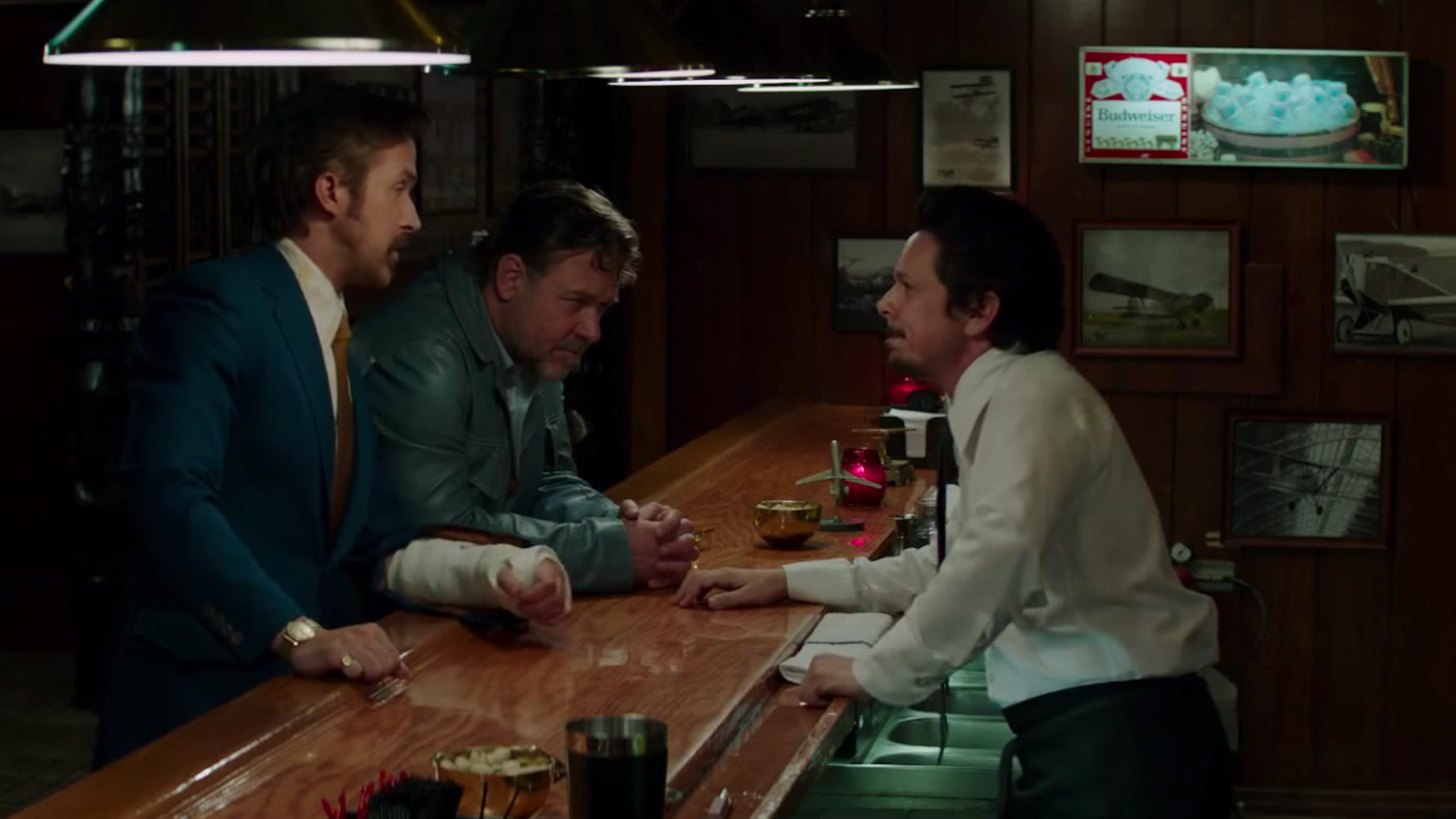“Something’s wrong with kids these days,” Jackson Healy (Russell Crowe) groans at the beginning of The Nice Guys in a cynical voiceover—a signature of writer-director Shane Black (Kiss Kiss Bang Bang, Iron Man 3, here co-writing with Anthony Bagarozzi). The two ironies at work in that line: “these days” is, in this case, referring to Nice Guys’ late ’70s setting, and Healy follows up his lament by viciously punching a drug dealer who’s preying on an underage girl. He may beat people up for cash, but he can’t help but show paternal instincts.
So does Holland March (Ryan Gosling), who actually has a daughter (Angourie Rice) to practice them on, but who has disappointed poor Holly time and again as he’s slid into sleazy private-eye practices and barely-functioning alcoholism. When Healy and March’s unsavory jobs lead them to one another, they combine efforts to investigate a missing counterculture figure (Margaret Qualley) and attempt to meet Holly’s naïve and earnest expectation that they be the good guys.
https://www.youtube.com/watch?v=z-_HQ0bUzS8
Since breaking onto the scene with the wave-making Lethal Weapon screenplay in 1987, Black has been known for action movies that force unlikely “buddies” to trade witty banter. Though Crowe and Gosling may not seem that distinctive at first, they both clearly relished sinking their teeth into worthy comedic material. Crowe’s deadpan delivery, with physical assaults as his only inflection, makes Healy his most captivating character in years. Meanwhile, Gosling pitches his borderline-pathetic P. I. at such a successfully vaudevillian level of slapstick that, at one point, he reacts to a mutilated corpse the way Lou Costello used to react to meeting the Wolfman or Frankenstein’s Monster. When their performances combine, they’re a tuba and a flute barely playing in tune. It’s not harmony, but it’s definitely chemistry.
Crowe’s deadpan delivery, with physical assaults as his only inflection, makes Healy his most captivating character in years.
Vibing slightly less successfully with Black’s LA odyssey is Holly herself, who seems out of place in this underbelly—both intentionally and to a fault. Yes, she draws better natures out of our “heroes,” but the running joke of a precocious thirteen-year-old besting both men at their detective work feels predictable against other, more subversive gags. And who are we kidding: are we here to watch Crowe and Gosling joke about shooting people, or to watch a kid admonish them for it? (That said, a beat where Holly insists they help a wounded henchman who was just chasing them is truly, memorably moving.)
The redeeming factor of this daddy-daughter dynamic is the way it lets Black reconsider and tweak the definition of masculinity his previous movies helped establish. Period-specific anxieties about killer bees and smog-choked birds frame the entire film as a clever analogy for the “birds and the bees” talk reluctant fathers dread. As Crowe and Gosling fret over future generations, the audience fills in our end of the irony, knowing that the kids will be alright, but sadly, they won’t be driving many electric cars.
Still, there’s no hiding youth from corruption in Nice Guys’ City of Angels; even a porn tycoon’s mansion party utilizes fairy-tale icons like Pinocchio and mermaids. Dads can’t protect their kids from how screwed up society is, but they can prepare them for it—often by embodying it. Nice Guys suggests that real men shoot first, ask questions later, and agonize throughout over how they’ll explain it to their kids. FL







